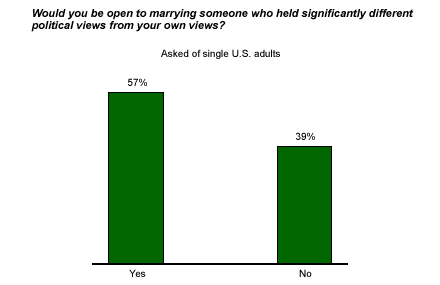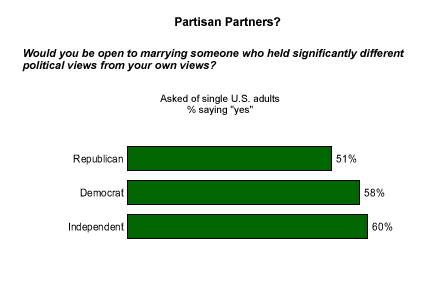As election year frenzy builds, one of the few things political commentators all agree on is that America is more politically polarized today than at any other time in recent memory. Just about everyone seems to harbor strong feelings of admiration or disdain for one presidential candidate or the other, and the resulting acrimony will only get more intense heading into November.
But the really "big question" is this: How is this political polarization affecting the country's singles' scene? More specifically, have differing political views become a deal-breaker for those seeking the perfect mate? Generally not, according to a July Gallup Poll for the online dating service Match.com*.
Gallup asked 1,000 unmarried Americans whether they would consider marrying someone who holds political views significantly different from their own. The majority of singles -- 57% -- said yes. But a substantial minority of singles -- 39% -- said they wouldn't be open to this kind of "mixed" relationship.

Younger singles are far more agreeable to the idea of marrying someone with different political views than are older singles: 66% of single Americans under the age of 50 are open to doing so, compared with only 41% of singles over 50.
The Other Side
Are those who identify with a partisan group more likely to accept a partner from the "other side"? There doesn't appear to be much difference: 51% of singles who identify themselves as Republicans say they would marry someone with significantly different political views, as would 58% of Democrats (60% of political independents say yes to this question). Large minorities of each group would not be willing to marry someone with opposing political views.

Lisa Keser, a 37-year-old engineer from Orlando, Fla., is a single Republican who would consider such a marriage. "I am not very extreme either way and actually agree with a lot of Democratic views even though I am a Republican," says Keser. "But, chances are I wouldn't end up falling in love with someone if they did not possess a lot of the same cultural and moral beliefs as me."
But not everyone sees a clear demarcation between political views and moral values. "Significantly different political views would mean significantly different values," says Scott Moody, a 33-year-old mortgage banker and registered Democrat from Richmond, Va. "If our values were significantly different, it would cause disharmony and contention on many levels. Somewhat different political views, OK. Significant, no way."
Bottom Line
Shows such as Crossfire and Hardball may reap ratings benefits from a heated political atmosphere, but a majority of single Americans are willing to leave the rancor to the professionals and accommodate political differences in a potential spouse. Some even look forward to the opportunity to explore those differences. "I consider myself an open-minded person who respects people's rights to disagree," says Jason McCartney, a 33-year-old college professor from Salisbury, Md., who is open to marrying a person with opposing political views. "I find differences and discussions exciting … Sometimes you may even realize that the other person is right and you were wrong."
*The survey results are based on 1,001 telephone interviews with a national sample of single men and women age 18 and over residing in telephone households. Single adults were identified as those who have never married, or were divorced or widowed. Those currently married or separated were excluded from the study. Interviewing was conducted by The Gallup Organization's full-time interviewing staff during the period of June 28 to July 11, 2004.
